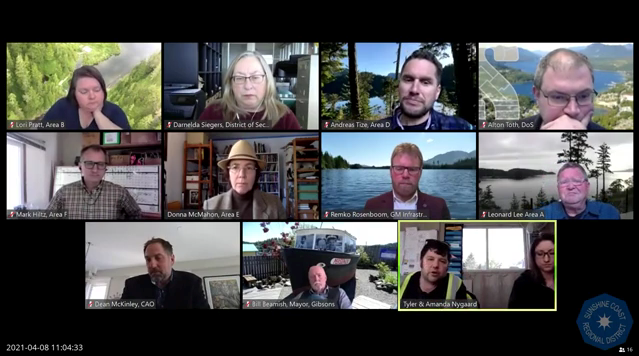As the Sunshine Coast Regional District (SCRD) contemplates whether to provide curbside recycling to its rural residents, more than 1,700 people responded to the recent survey.
The majority of respondents were in favour of adding the service, with 72 per cent indicating their interest in receiving and paying for curbside recycling. The remaining 28 per cent not of respondents were not interested.
At the April 8 infrastructure services committee meeting, directors voted to ask staff for more information about the impacts of adding a curbside service in a future report. The voting directors (Areas B, D, E and F) chose to consider option one, which would implement curbside recycling services in the four electoral areas. An estimated total annual user fee based on this option ranges from $239 to $253, depending on service delivery model and whether the SCRD will provide blue bins. The recycling service would be $30 to $34 per year.
The selected option does not require an alternative approval process, and is estimated to be implemented by the third quarter of 2022. While the staff recommendation says option one has the maximum opportunity for participation and diversion potential, it also has the maximum impact on depot recycling of the options presented.
Robyn Cooper, manager of solid waste services, told the board that the objective is to provide a convenient option for people with mobility issues, without a vehicle and those not currently recycling.
By electoral area, the survey results showed Areas B and D’s respondents were approximately 75 per cent interested and 25 per cent not. Area E was 71 per cent interested and 29 per cent not, while Area F showed 60 per cent interested and 40 per cent not. Of those who responded to the survey, 31 per cent were from Roberts Creek, 29 per cent from Elphinstone, 29 per cent from Halfmoon Bay and 11 per cent from West Howe Sound.
Area D director Andreas Tize said that he’s heard from Roberts Creek residents that they are in “resounding” favour of curbside recycling.
Area E director Donna McMahon said she feels conflicted, and feels strongly about setting up in all the electoral areas since it’s a small market and only adding service in some of the rural areas would impact potential competitive contracts.
“I’m either all in or all out,” McMahon said.
She also added her concern that the decision of whether or not to add curbside recycling seems to be “pitting one segment of the population against another” since she said Facebook comments showed young families are in favour of adding the service, while more senior residents are against since they have time to go to the depot and are on fixed incomes, so do not want fees to go up.
Directors asked staff to include information about the impact of diversion, increased costs to the depot, and other questions from directors in the future report on service delivery model.
Some directors expressed concern about the local government’s role in providing the proposed service, especially considering residents would not be able to opt out, and asked if a private company could step in instead. Staff said that any private company would have to work outside of the provincial network of recycling programs, and could not take materials to the local depots, which are residential-only. A private company would need to haul into Vancouver at a facility outside of the provincial system.
Area F director Mark Hiltz asked if a pilot project could be an option, but staff said that Recycle BC cannot subsidize a study, only implementation, and the SCRD would have to take on those costs in full.
Near the end of the meeting, the public was invited to ask questions or comment. Tyler and Amanda Nygaard of Gibsons Recycling Depot joined the virtual meeting, and told the board that they anticipate a significant impact to their operations should a curbside service be implemented. They said it would be noticeable for the year that their current contract would overlap with the proposed new service.
The staff report on the curbside recycling states that adding curbside recycling collection in Areas B and D “would reduce incentives the SCRD receives from Recycle BC to support the Sechelt depot service by an estimated $10,000 annually... Implementation in Electoral Area E, or E and F would not impact incentive rates for the Gibsons Recycling Depot but would result in reduced depot volumes.”
Lower volumes to Gibsons Recycling Depot would reduce the incentives the operation receives from Recycle BC, and a decrease in revenue would need to be offset by higher taxation.
More information is available at www.scrd.ca/curbside-recycling.



